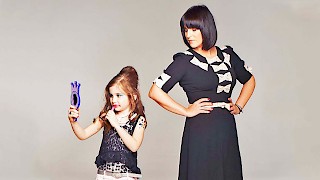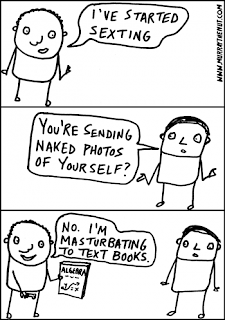I was up watching "The Sex Education Show" last night, which has a campaign going on called "Stop Pimping Our Kids". Now, in theory, this is something I agree with- do young girls really need padded bras if they aren't developing breasts yet, should magazines like Front be at toddler height in WH Smith's, and does anyone really need underwear that says "your pad or mine?" on the waistband? Of course when she says "kids" she mostly means girls, as people generally do. And really, is this a problem with "pimping kids", or reflective of our issues with sexuality in general..?
The biggest problem of course, to me, was shown when the host showed little girls (at a pamper party, mind- makeup and temporary tattoos and nail polish were apparently ok) a selection of what she deemed "age inappropriate clothing", and the girls loved them- unlike their mums. These girls were already buying into cultural ideas about female sexuality- being coquetteish, for example, or wearing eyeshadow and heels. But these aren't cultural ideals that are pimped to children, though of course they pick up on them- they're pimped to everyone. But that's not addressed, of course.
Another thing I noticed that wasn't addressed was that these clothes deemed "inappropriate" were exclusively being sold in the less expensive clothing shops- Primark, Matalan, Peacocks. Then I looked into this more- Marks and Spencer has padded bras, though they seem geared to 10-13 year olds, size-wise, I think that's an important piece to add to this conversation- why is it that these products are pushed at and bought by working class families much more often than by middle class ones? Is that not also a problematic subtlety that should be considered in this debate? Instead, it was pitched in a very polarizing sort of way that discouraged critical thinking about how sexism is affected by class and race.
The show suggested to me another issue at its heart- people being uncomfortable talking about sexuality while buying into the hype about what sexuality should be and how it should look. No wonder there's a problem, to be honest- if you create a culture where the color green is everywhere but make everyone feel really awkward about mentioning it or asking questions about it, people will very likely toe the party line while not really understanding what they're doing or why. That's just common sense, right?
There's this whole belief that's been hammered in that children are, first of all, innocent (innocent, by the way, being defined as "without sin", or "uncorrupted by wrongdoing"), and secondly, too young to understand important things. Both of these are problematic, I think, and I would put money down that our cultural desire to shield children is the thing that puts them most at risk. Don't believe me? Watch "16 and Pregnant", then beat your head against a wall when you see what Bristol Palin raked in for advocating abstinence only sex ed. Which doesn't work, and means they're still having sex, just now without condoms. Works as well as telling kids not to do drugs, or making teenage drinking illegal, right? Thank god we're thinking of the kids!
But kids having sex is BAD, right? And children now do have some sort of innocence (dearly bought by children who died doing 16 hour work days in factories, for a start). Look up "innocence and children" in Google and you'll find page after page bemoaning the loss of innocence thanks to porn, child prisons, war, and, oh, right, porn again.
Do I think children doing porn is a good thing? No, I don't, though probably not for the reasons you think- I think that performative sex can really only happen healthily when one has enough knowledge, agency, and experience to make an informed decision about it- I think that children may not think about the consequences of exploring their sexuality in a way that's filmed (sexting being a great example of "seemed like a good idea at the time, then it ruined my life" though it won't get you pregnant)- I think that when children aren't educated about sex and sexual pleasure it can become all too easy for an adult to manipulate a child into forgetting their agency as they try to please the adult. A child doesn't have as many options as an adult does- they may not be able to leave or they may feel attracted to the attention or gifts but feel guilty saying no. It's harder for them to make informed choices (not that they can't, mind, but it's harder). Is this about innocence, though, or agency?
I think about this a lot (and it's hugely controversial) because of two things.
1) I was a very sexually curious girl at twelve- I had books on sex ed ranging from "A Kid's First Book about Sex" to the "What's Happening to my Body" book for boys, and the one for girls. I had discovered masturbation and sexual fantasies, thanks in part to Nancy Friday, and I knew what I wanted and how I wanted it. I kind of had to wait for the boys to catch up, though.
2) I studied anthropology, particularly in the area of sexuality, and discovered that not all cultures thought kids shouldn't have sexualities until they were 16. Some cultures like the Sambia encouraged man-on-boy oral sex as a way of passing male vitality on to the next generation. Other cultures allowed sexual exploration between children as long as they were in the same age group. Still others had teenage sex huts to give teens a chance to have some privacy away from family while also learning how to cohabit. There were lots of examples of this:
Ford and Beach (1951) described cross-cultural examples of child–adult sex from the Human Relation Area files at Yale University. Among the Siwans (Siwa Valley, North Africa), “All men and boys engage in anal intercourse. Males are singled out as peculiar if they did not do so. Prominent Siwan men lend their sons to each other for this purpose” (pp. 131–132). Among the Aranda aborigines (Central Australia), “Pederasty is a recognized custom: : : . Commonly a man, who is fully initiated but not yet married, takes a boy ten or twelve years old, who lives with him as his wife for several years, until the older man marries” (p. 132). Diamond (1990) reviewed child–adult sex in Hawaiian history and Polynesia. In the eighteenth century, Cook (1773) reported copulation in public in Hawaii between an adult male and a female estimated to be 11 or 12 “without the least sense of it being indecent or improper” (cited in Diamond, 1990). Sexual interactions between adult and child were seen as benefitting the child, rather than as gratifying the adult. The sexual desire by an adult for a nonadult, heterosexual or homosexual, was accepted (Pukui, Haertig, & Lee, 1972, cited in Diamond, 1990). Suggs (1966), studying Marquesan society, reported considerable childhood sexual behavior with adults (cited in Diamond, 1990). He reported many examples of heterosexual intercourse in public between adults and prepubertal children in Polynesia. The crews of visiting ships were typically involved and assisted by adult natives. Occasions were recorded of elders assisting youngsters in having sex with other elders. In many cultures of Oceania, prepubertal females were publicly sexually active with adults (Oliver, 1974). In Tahiti, in 1832, the missionary Orsmond observed that “in all Tahitians as well as officers who come in ships there is a cry for little girls” (Oliver, 1974, pp. 458–459, cited in Diamond, 1990). Among the Etoro of New Guinea, from about age 10 years, boys would have regular oral sex with older men, swallowing their semen to facilitate growth (Bauserman, 1997). Amongthe neighboring Kaluli, when a boy reached age 10 or 11, his father would select a man to inseminate him for a period of months to years. In addition, ceremonial hunting lodges would be organized where boys could voluntarily form relationships with men who would have sexual relations with them (Bauserman, 1997).
This was food for thought for me, especially as I was also studying sexuality from the field of psychology, and really enjoying my ethics classes. Were children inherently innocent? Was child sexuality wrong? Was there a way for children to explore sexual urgings alone and with each other without being taken advantage of? And especially (I quote here because Dr. Richard Green, from the quote above, says it concisely):
These cross-cultural examples are not cited to argue for similar practices in Los Angeles or London. But are we to conclude that all the adults engaged in these practices were mentally ill? If arguably they were not pedophiles, but following cultural or religious tradition, why is frequent sex with a child not a mental illness under those circumstances? For skeptics of the relevance of these cited exotic examples, for three centuries the age of sexual consent in England was 10. This was not in some loin cloth clad tribe living on the side of a volcano, but the nation that for six centuries was already graduating students from Oxford and Cambridge. Further, the time when age of consent was 10 was not in a period contemporaneous with Cromagnon Man, but continued to within 38 years of World War I. The impetus to raise the age of sexual consent in England from 10 years was fueled not by an outrage over pedophilia per se but concerns over child prostitution. Changes in employment law during the nineteenth century were protecting children from long hours of factory labor, leaving them more accessible for sexual service as the only means of support. Child prostitution was rampant (Bullough, 1990). Were all customers pedophiles? Were they all mentally ill?
It made me ask- is the issue really about the loss of sexual innocence, or is it that, by not educating children about their bodies, making sexual fantasies something to be ashamed about, and being too nervous to answer sex-related questions from the kids asking them, we have damned them by ignorance? How can someone have agency over sexual decisions if they are not able to educate themselves fully? By so easily flying into a panic about children displaying sexual curiosity (sometime even creating moral panic by making things up) have we, as a culture, contributed to the problem we're trying to solve?
I haven't done nearly enough reading into this, though the reading I have done suggests that in cultures where child sexuality and even pedophilia are seen as normal, kids who engage in it aren't emotionally scarred. By (often through imperialist and Christian-centered means) making it taboo, then, and especially by pointing angry fingers and making accusations of unethical behaviour whenever someone DOES try to allow kids access to sexual information, I wonder if we have actually done children a disservice. Denying them information that would lead to agency and informed choices cannot do much to reduce harm.
I'm biased, of course. I grew up in a family where I could run into the bathroom and ask my mother if I had breast cancer because my nipples were starting to develop. I knew where the condoms were in the house and where I could get them. I wasn't afraid to tell my parents about my sexual identities as they shifted and developed. I wasn't brought up feeling ashamed- I was brought up to be loud and proud about my agency. Innocent? I was innocent about sex- because I wasn't brought up to think sexual desire was sinful or wrong.
And you better believe I'll bring up my kids the same way.
They can be innocent, but they won't be gullible.





Be the first to comment
Post a comment